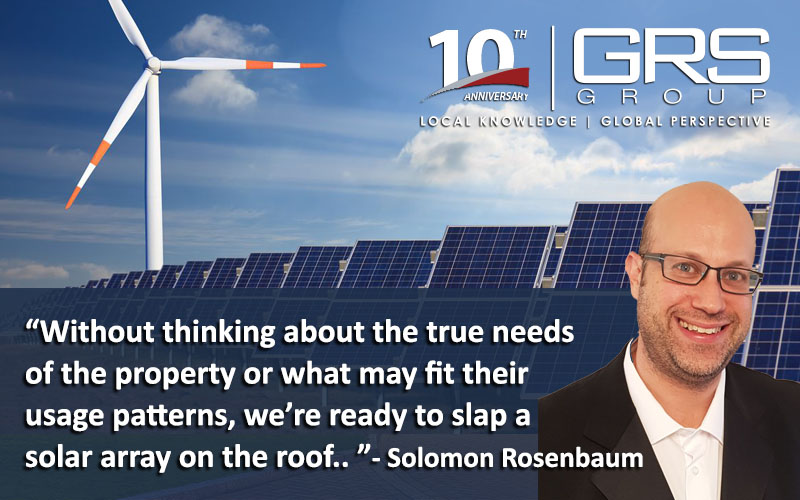Sol Rosenbaum PE, CEM, CPMP is director of Green & Energy Services at GRS Group. He can be reached at (443) 320-0429 or by email at [email protected]
The recipe for our energy conversation these days seems to be something along the lines of the following. Take three big scoops of solar and mix them in a large bowl. Add a dash of wind power and perhaps some hydro-electric depending on the topography. For extra flavor, add in a touch of geothermal power. Like things spicy? Toss in some nuclear energy and watch the arguments (pro & con) fly!
If the recipe you are looking for is one to satisfy the question of how can we eliminate fossil fuels or reduce pollution, then this is a fair solution.
However, I think this begins the conversation in the wrong place.
To better understand this issue, I like to compare it to one of my favorite summertime activities; a nice BBQ with friends and family.
Imagine you are on your way home from work on Thursday when you realize that the BBQ is just three days away. You decide to take a detour after work to stop at the butcher and pick up some of the meat.
With a plethora of options in front of you, you start to run the different scenarios in your head. Should we go with steaks or maybe save some money and go with burgers? The hot dogs come in a 12 pack, but is that enough? Maybe the 24 pack is the better option.
But wait! Shouldn’t you hammer out the invite list first so you know what quantities to purchase and avoid too much leftover food? Further, shouldn’t you check the allergy or dietary needs of your guests to ensure that the purchased foods are suitable?
To me, this is the way we are approaching the energy conversation.
Without thinking about the true needs of the property or what may fit their usage patterns, we’re ready to slap a solar array on the roof. We’re ready to size a solar array based on last year’s usage without thinking if that is really representative of the building’s future usage. Did we stop to consider the “leftover” energy that might be produced, but can’t be sold back to the grid and ends up wasted?
I think we need to adjust our mindset and stop asking the question of how we can eliminate fossil fuels or reduce pollution per se. The question we should be answering is how we can best provide for the energy needs of the populace and how can we ensure this need is met effectively for years to come.
Under these conditions, the first step is to assess what we are currently using and if that baseline is representative of future use or if it can be reduced. By performing an energy audit and implementing energy efficiency measures, we can reduce the overall energy usage and better meet the needs of the individual buildings as well as limit the need for renewables in the first place. Keep in mind; although renewables are not a finite resource like fossil fuels, they are a finite resource in the sense that raw materials needed to gather them are not unlimited.
Taking this approach makes sense from several vantage points . . .
- From the business side of things, this reduces the operating costs incurred by energy usage. Additionally, if solar or new equipment is to be installed, it will reduce the size and cost of the installed array/equipment.
- From the environmental side of things, less pollution is created through the reduction in both the energy usage at the property and in the energy required to manufacture the renewable sources. Regardless of how environmentally friendly a solar panel might be, not having to make it in the first place is always a better option.
- From the city or utility grid planning perspective, we can get more out of the infrastructure we currently have in place. Capacity concerns can be alleviated or at least held steady which can keep the costs of infrastructure replacement down. Changing from coal power to solar power will not change the fact that increases in population mean increases in overall usage.
Therefore, the first step to a better energy future is to push energy efficiency projects and then focus on the renewable side of things. Realistically, I do realize that they can happen in conjunction to some degree. However, the actual implementation of renewables should only be considered once the efficiency of the users is addressed.
Through the Fannie Mae/Freddie Mac green programs and general energy services, GRS Group has helped many properties lower their energy usage. Want to know more about these programs and how you might benefit from them? Please reach out to me directly or your GRS representative for further details.
About GRS Group
GRS Group is a leading provider of commercial real estate (“CRE”) services worldwide. With offices across the United States, Europe, and affiliates around the globe, GRS Group provides local market knowledge with a global perspective for institutional real estate investors, occupiers and lenders worldwide. The GRS Group team has evaluated and advised on over $1 trillion in CRE transactions.
Through the company’s proprietary management process, Global Services Connection, GRS Group delivers an integrated suite of services including Financial Advisory, Transaction Management, Assessment and Title Insurance. We provide a single point of contact, capable of leveraging the GRS Group portfolio of companies and delivering customized solutions to assist our clients in achieving their investment goals.

